Recently I was asked, “What is the single most important and beneficial change a person could make to their life right now?” Of course I can think of many things, such as proper breathing, creative release and regular exercise, but when I reflect back on my practice and really think about it, as well as what I discuss in my book Food As Medicine, I can say it in one word: breakfast. Of course, this may come as a no-brainer to some of you, but if this is the case, you might be surprised how many people regularly skip this meal, or choose something entirely inappropriate.
Based on a perspective that sees human health and natural rhythms intertwined, Ayurveda suggests that your digestion and metabolism is directly related to the path of the sun across the sky. Thus when the sun first rises, we only begin to feel this influence weakly, but as the sun rises higher and higher in the sky, burning away the morning mist and dew, digestion and metabolism similarly increase until they reach their peak at midday. Thereafter, as the sun begins to decline, so too does our digestion and metabolism in preparation for sleep. According to Ayurveda, we want to eat on the ascent of this curve, following the ancient axiom that we ‘breakfast like a king; dine like a pauper’. Doing so ensures that our mind and body are properly fed, providing us with energy throughout the day. Every day is a journey, and just like when you pack up to go on a trip, you want to make sure that you are well prepared. Imagine if you were heading off on a road trip, and pulled over to get some gas. Let’s say you put only a couple bucks worth of gas in the car – you wouldn’t get very far, would you? Now imagine the hassle of having to pull over every so often just to get a few more bucks worth of gas to keep you going. Using this approach, you might even find that you run out of gas in the middle of nowhere. Nobody would think to do this, and yet many people treat their cars with more foresight and care than they do their own bodies!
The common pattern is to either skip breakfast or to have something quick, then perhaps have a light lunch, but as the afternoon progresses hunger sets in and these people begin to snack, eating almost continuously throughout the day and into the evening. This pattern, called ‘evening hyperphagia,’ is linked to obesity and weight gain, and in Ayurveda is directly opposed to the natural rhythm. It’s also the reason why many people say they aren’t hungry in the morning – simply because they ate too much the evening before. Eating too much at night not only causes you to pack on weight, it directly impairs digestion, and in my experience, is linked to everything from hiatus hernia to sleep apnea.
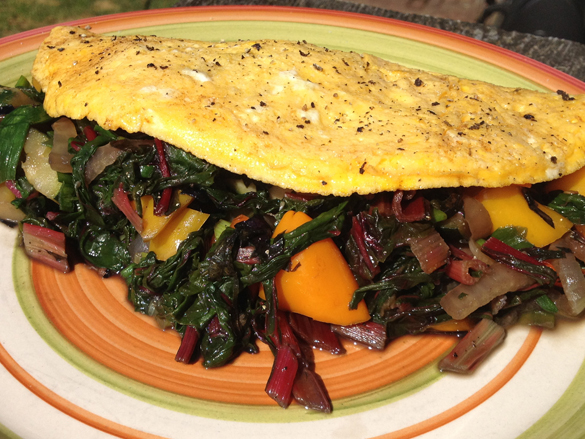
According to Ayurveda, ill health and disease frequently occur because of a failure to observe natural rhythms and cycles. Sometimes it’s easy for us to forget that we are a part of the earth, and therefore affected profoundly by natural rhythms. If you consider the dietary practices of traditional peoples, there aren’t many groups that skipped breakfast, and those that do usually ate a big lunch, and then booked off for a couple hours of sleep. But if you live in temperate regions such as North America and Europe, just imagine if you were a farmer, heading out for a day of chores: milking the cows, cleaning the chicken coop, mending fenceposts – with nothing more than a bowl of cereal or a muffin in your tummy. I don’t imagine that many of you would be all that productive – which is exactly why farmers typically ate a big breakfast: something that would give them energy for hours.
Which brings me to the notion of eating many meals all day long, a piece of advice from sports nutrition that is applied to the population at large, but doesn’t really work. I think it is a huge mistake to eat all day long – not only are you unconsciously consuming a lot more calories than you are aware of, but constantly eating or ‘grazing’ as some people call it, places stress on your digestive system. I teach my patients that digestion happens in three major phases – gastric, intestinal and colonic. During the gastric phase, all of the energy of digestion is focused on the stomach, as it releases powerful acids and enzymes, contracting in waves to break down the food. The intestinal phase kicks in when the stomach empties into the small intestine through the pylorus. Now the energy of digestion shifts from the stomach to the small intestine, which in a similar fashion, releases digestive substances including bile, pancreatic and brush border enzymes to break down the food partially digested by the stomach. During this phase, the stomach collapses upon itself and relaxes, becoming quiescent until more food is eaten. As the food snakes its way through the small intestine, broken down into smaller and smaller particles for absorption, what is left over is then passed on to the colon. During this colonic phase, the remains of the digested food is inoculated with bacteria to form the feces, the colon reabsorbing excess water and only few nutrients. At this point, when the food is passing through the ileocecal valve from the small intestine to the colon, the appetite usually returns and the stomach begins to gurgle, looking for food.
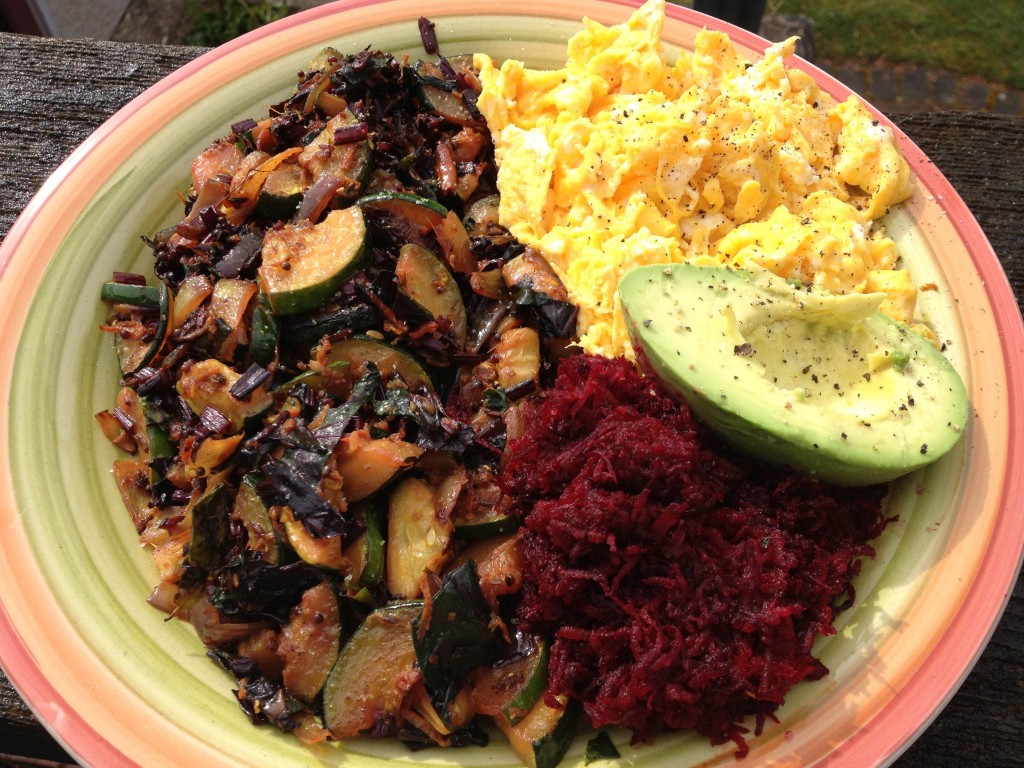
These three phases of digestion: gastric, intestinal and colonic, happen in a coordinated fashion, and eating frequently doesn’t allow for this coordination. Constantly filling the stomach with food takes energy away from the small intestine and impairs the efficiency of digestion. It essentially diverts a natural flow of food through the body, to one of dysregulation and chaos. In my clinical experience, and according to Ayurveda, eating frequently and randomly places enormous stress on digestion, and creates a cycle of dysregulation that extends from blood sugar issues to hormone dysfunction. I don’t believe there is any more truth to the notion of being a ‘grazer’ as many people claim, than there is of being a ‘night owl’. Staying up late is only possible with light, and hence electricity – how long would you spend trying to stay up in the dark without it? Likewise, abundant cheap food has meant that we no longer have any naturalistic control over the eating impulse. Do you think for one moment a farm wife would allow you to pinch the goods in her larder all day long, whenever you wanted? Not likely!
Both of these claims – that of being a grazer or a night owl – are just the result of a choice, albeit a choice made in ignorance of just how powerfully technology has affected our lives. Traditional peoples neither stayed up late at night, nor did they eat all day long. Many traditional peoples ate just twice a day – morning and evening eating – leaving the daytime for activity, work and play. The challenge is how do you get away with eating twice a day? Research has demonstrated that eating less promotes longevity, but just as soon as we start eating less most of us find that we get hungry! As a result, people become hypoglycemic, and low blood sugar leads to increased appetite and a myriad other symptoms that range from anxiety to fatigue. Dieticians thus recommend eating 6-7 small meals a day, which in turn shifts hypoglycemia to a sustained hyperglycemia (elevated blood sugar), with little drops in blood sugar signalling the next wave of feeding. As a result people gain weight – except perhaps vegans, who are almost always hungry – and as they gain weight they increase their risk of almost every disease in the book. This is because sustained elevated blood sugar causes direct damage to the arteries, promotes insulin resistance, and leads to cardiovascular disease, diabetes and cancer. What we should be trying to achieve is blood sugar that is neither too high, nor too low – the sweet spot – ‘just right’, as Goldilocks said. But we can’t achieve this by eating snacks all day long, leaving it up to appetite, circumstance and whimsy. We need to fuel up for the day, and this is exactly why I recommend a high fat, high protein breakfast with lots of above-ground veggies that add fiber. Eating this way ensures that the blood sugar is replenished but at a steady rate that extends over many hours, using the body’s ability to burn fats and proteins slowly. This is very much unlike the starchy breakfasts such as cereal, oatmeal and toast favored by many: all of which give you a little burst of energy, but then cause you to crash and burn a short time later. And if you crash out before lunch, it’s probably not going to be a good day.
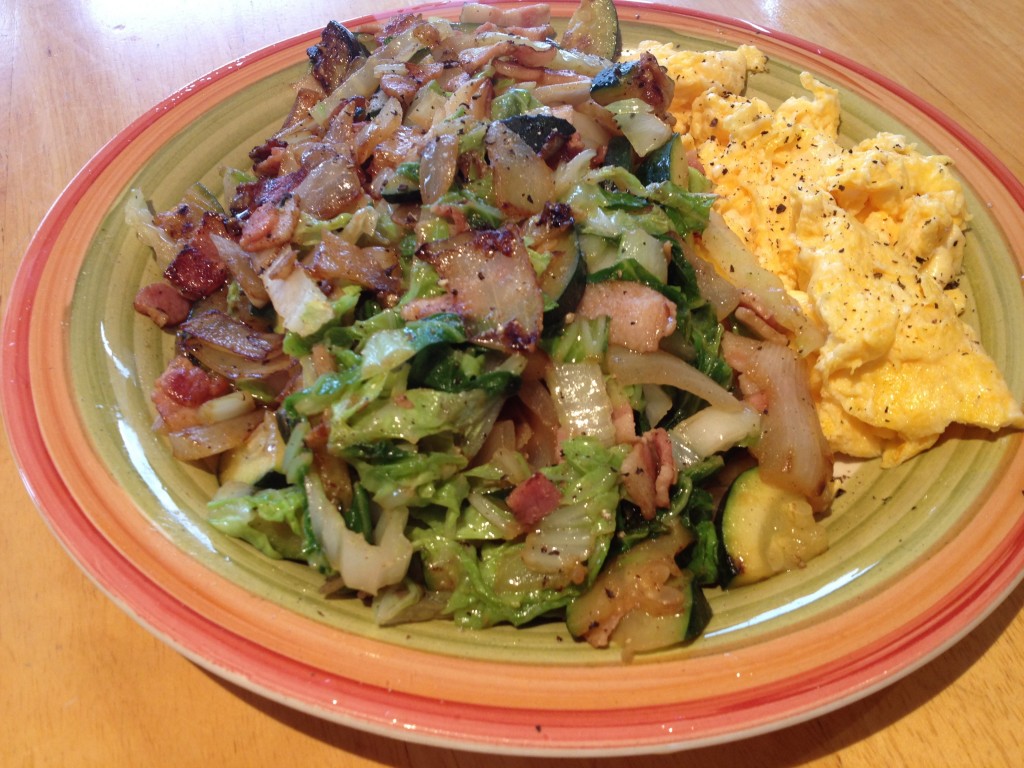 About five years ago I had a patient come to me complaining of chronic anxiety and infertility. Her typical breakfast was a coffee, maybe a muffin, a salad for lunch and snacks for the rest of the day. She was a vegetarian, wasn’t overweight, and otherwise looked like a healthy, fit person. She had suffered from chronic anxiety however, for the last 18 years, and infertility for the last 13. The only thing I had her do was have lamb stew for breakfast. Day four she called me up to say the anxiety had disappeared. Two weeks later she said that she had noticed a major change in her cervical mucus, suggestive of ovulation. Time after time I get similar reports when patients and students make this change. They often don’t believe me but when they make this change many experience it like a miracle. Suddenly they have more energy, better mental focus, and feel more optimistic about their lives. Yes, it’s just breakfast, but if you can eat a big meal in the morning and not even think about food all day long until mid-afternoon, I guarantee you’ve had a very good day indeed!
About five years ago I had a patient come to me complaining of chronic anxiety and infertility. Her typical breakfast was a coffee, maybe a muffin, a salad for lunch and snacks for the rest of the day. She was a vegetarian, wasn’t overweight, and otherwise looked like a healthy, fit person. She had suffered from chronic anxiety however, for the last 18 years, and infertility for the last 13. The only thing I had her do was have lamb stew for breakfast. Day four she called me up to say the anxiety had disappeared. Two weeks later she said that she had noticed a major change in her cervical mucus, suggestive of ovulation. Time after time I get similar reports when patients and students make this change. They often don’t believe me but when they make this change many experience it like a miracle. Suddenly they have more energy, better mental focus, and feel more optimistic about their lives. Yes, it’s just breakfast, but if you can eat a big meal in the morning and not even think about food all day long until mid-afternoon, I guarantee you’ve had a very good day indeed!
*NOTE* The images that are embedded in this post are typical breakfasts at my house. Right now its 5pm and as I’m writing this I’m just starting to get hungry – and today we had stir-fried nettles, chard and onion, with basted eggs and bacon. Ok, just writing that made me hungrier! But even though I’m hungry I don’t feel crashed out – like I NEED to eat. Vegetarians who avoid eggs can get similar effects, but will probably need to eat thrice daily, starting breakfast off with a generous portion of plain raw yogurt, eating whole grains, pulses and vegetables for lunch and supper. A little fruit is a great mid-afternoon snack when it’s in season, but sugary snacks and sweets including dried fruit typically results in a blood sugar crash later on. For more details on this pattern of eating, and how to stay healthy with food and the seasons, please check out my book Food As Medicine: The Theory and Practice of Food.
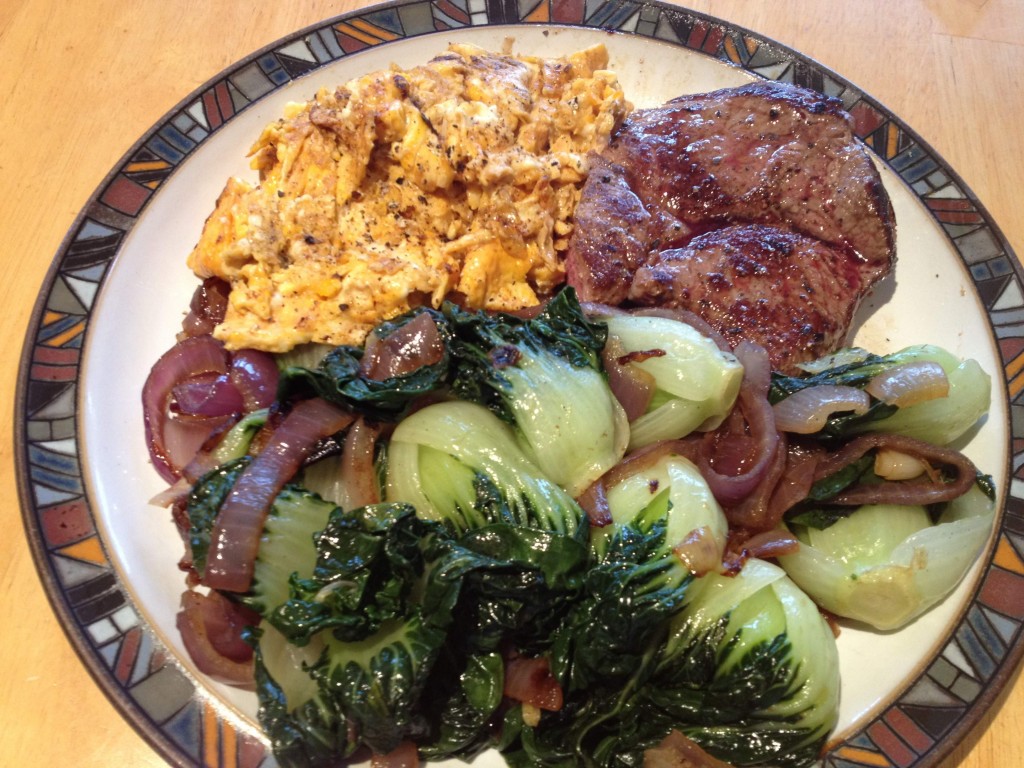
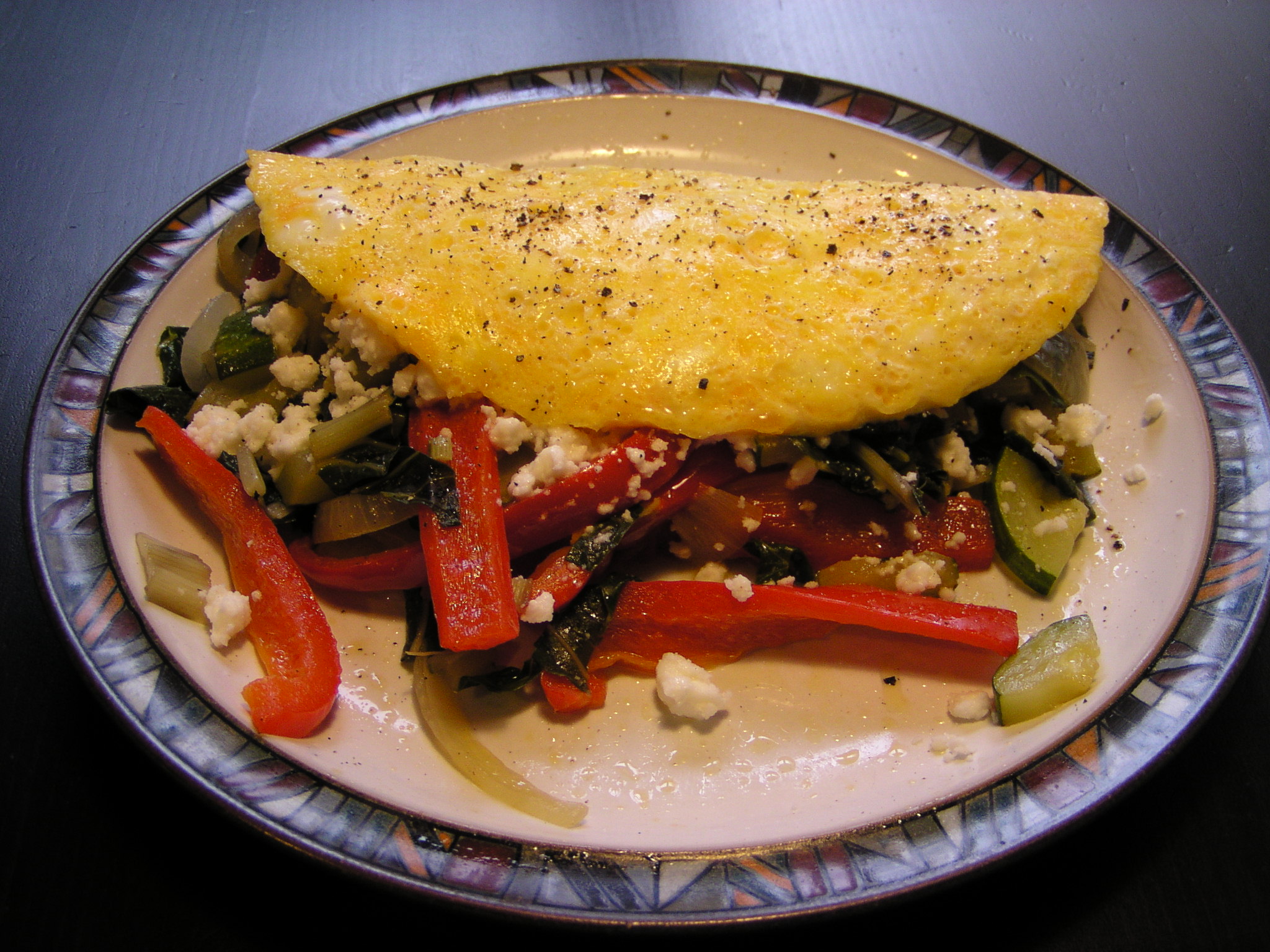
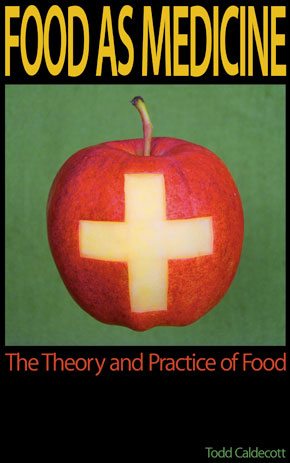

Wow. It’s 10a.m.; I’m home sick, and am now ravenous. Every one of your breakfasts look delicious. OK, I made a pot of beans last night, and we have some eggs, salsa, sour cream, maybe some smoked sausage. I’m thinking breakfast burrito. I do need to improve my relations with actual vegies, treating them as food, not entertainment. I do find I can sometimes psych them out, sense who they are and what they want to do, check out a decent recipe or two, and experiment. Does take time, but hey. Better go eat now…
Hi Morgan – when you’re sick eat foods that aren’t too heavy and greasy. Some soup and vegetables sounds about right. Burritos are usually made with flour tortillas, which have gluten and usually refined oils and preservatives. You might do better to bake a couple sweet potatoes, and then put all the toppings on this. With a lid in the oven, you can bake sweet potatoes in under 30 minutes.
As for vegetables, the word literally means “to live”.